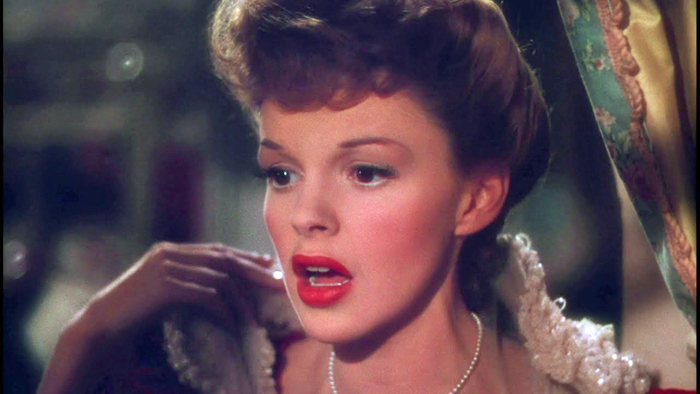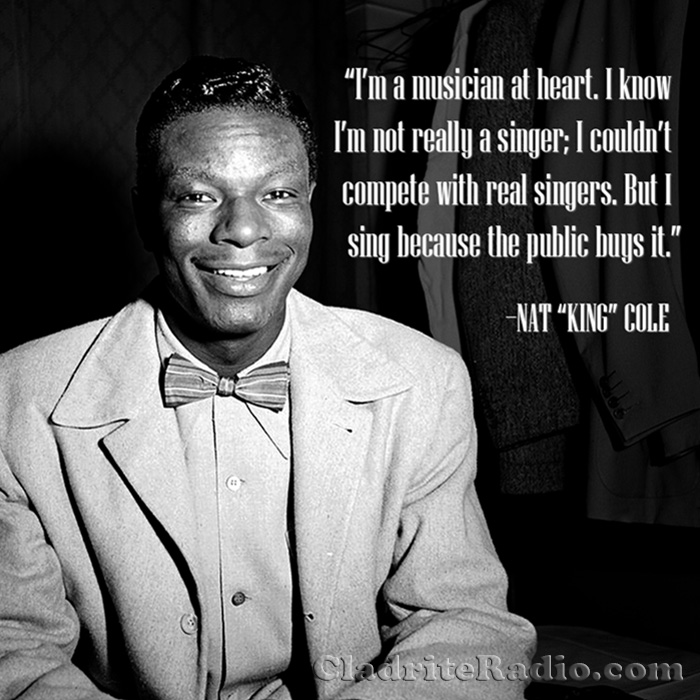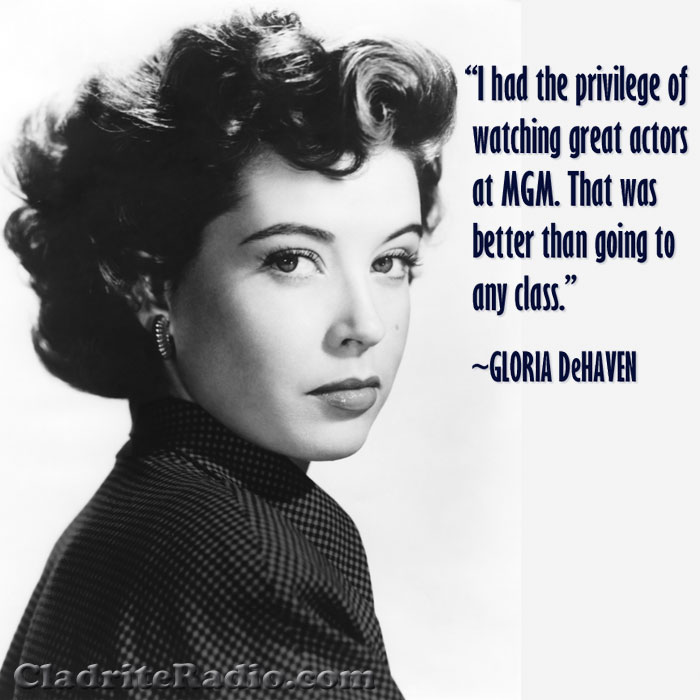Here are 10 things you should know about Gloria DeHaven, born 97 years ago today. Her career on screen, stage, radio and television spanned 65 years.
Tag: Frank Sinatra
18 Things You Should Know About Humphrey Bogart
Here are 18 things you should know about Humphrey Bogart, born 121 years ago today. A true icon of Hollywood’s Golden Age, Bogart is as recognizable and, arguably, as popular today as when his career was in its prime.
The Twisting Path to a Merry Little Christmas
Our favorite Christmas song has long been Mel Tormé and Bob Wells’ The Christmas Song, made famous by Nat “King” Cole (and really, no one else need tackle the song—every other artist who’s taken a stab at it has fallen short, in our eyes), but coming in a close second is Have Yourself a Merry Little Christmas, credited to Hugh Martin and Ralph Blane (though Martin has since claimed he wrote it alone, with Blane’s encouragement) and introduced by Judy Garland in Vincent Minnelli‘s Meet Me in St. Louis (1944).

From its familiar opening lyrics—Chestnuts roasting on an open fire, Jack Frost nipping at your nose, yuletide carols being sung by a choir, and folks dressed up like Eskimos—The Christmas Song celebrates an idyllic holiday season, but let’s face it, for many, the holidays carry with them a tinge of melancholy—especially in difficult times like these—and Have Yourself a Merry Little Christmas openly acknowledges the bluer side of the yuletide.
In the lyrics as we know them, that melancholy is leavened by a certain “keep-your-chin-up sticktuitiveness,” but it wasn’t always so.
The first set of lyrics Martin delivered, which I found in this very informative 2007 Entertainment Weekly story by Chris Willman, were downright maudlin, intended to fit the mood of Garland’s character, who, at the point in the picture at which she sings the song, is upset that her father is moving the family from her beloved St. Louis to New York City.
The story has it that director Minnelli and Garland urged Martin to come up with something just a bit less gloomy, and he agreed, soon delivering a second set of lyrics, the ones Garland sings to young sister Margaret O’Brien in the movie.
Then, in 1957, Frank Sinatra, who was recording a Christmas album called A Jolly Christmas, asked Martin to kick the the Christmas cheer up yet another notch. He specifically asked the composer to revisit the line in the final verse about “muddling through,” and that’s how we came to have the line about hanging a shining star upon the highest bough in yet a third set of lyrics to the song.
Most folks are familiar with versions two and three—Linda Ronstadt melds the two sets of lyrics in her recording of the song—if not with the original gloomy lyrics.
But did you know Martin wrote a fourth set of lyrics? In 2001, the composer, then 86 years old, wrote an overtly religious set of lyrics to the song, entitled Have Yourself a Blessed Little Christmas.
Listen: Judy Garland—Have Yourself a Merry Little Christmas
Listen: Frank Sinatra—Have Yourself a Merry Little Christmas
This post originally appeared in slightly different form on December 10, 2010.
Happy 98th Birthday, Nat “King” Cole!
Nat “King” Cole was born Nathaniel Adams Coles 98 years ago today in Montgomery, Alabama. One of the true giants of American music, Cole, as well-regarded as he still is, does not, in our opinion, get sufficient credit for his talents, accomplishments and contributions. Here are 10 NKC Did-You-Knows:
- Cole was the second of five children born to Edward and Perlina Coles. The family moved to Chicago when Cole was four, where his father entered the ministry. Cole’s mother was a church organist who gave young Nat his first keyboard instruction. He began to take formal lessons at 12 and learned to play pop, jazz and even classical music.
- Cole attended Wendel Phillips High School, where gospel and R&B legend Sam Cooke also attended some years later. Cole began performing professionally as a teenager, dropping the S from Coles and shortening his first name to Nat. His older brother, Eddie, a bass player, was a member of Cole’s first band.
- The two siblings cut their first record, under Eddie’s name (probably because Nat was still a minor), in 1936. It was during this time that Nat was given his “King” nickname, said to be a play on the Old King Cole nursery rhyme.
- Cole found his first success as part of a trio (though they weren’t yet the King Cole Trio, as they would come to be known, but the King Cole Swingsters). Radio was key to their rise in popularity, and they became a popular act in the Los Angeles area. Nat’s piano playing was his claim to fame, but he had started to add vocals to a number of the tunes in the trio’s repertoire.
- In 1943, Nat “King” Cole and the trio signed with the fledgling Capitol Records, and their success financed the company’s growth. To this day, the round structure that is the company’s headquarters, built in Hollywood in 1956, is referred to as “the house that Nat built.”
- That same year, Cole notched his first mainstream vocal hit with Straighten Up and Fly Right, one of his own compositions. The song based on an African-American folk tale that his father had used in his sermons.
- In 1944, Cole became a Freemason, joining Southern California’s Thomas Waller Lodge No. 49, which was named in honor of jazz legend “Fats” Waller.
- Cole’s popularity in the 1950s was unprecedented for an African-American performer. In that decade, though it’s not well remembered today, Cole’s records outsold Frank Sinatra‘s by a wide margin. Cole even recorded a trio of albums in Spanish (phonetic only—he didn’t hablan español). His Spanish was reportedly pretty bad, but many Spanish-speaking listeners found his clumsy efforts charming and his popularity only increased.
- Cole became so popular that on November 5, 1956, he began hosting his own television show, The Nat “King” Cole Show,” on NBC; he was the first African-American artist to host such a show. The show did fine in the ratings, but no sponsor for the program was ever found, a must in those days. Just over a year after it hit the airwaves, Cole pulled the plug on the show. The strain of operating a show without a sponsor’s backing was too much. After the show’s demise, Cole was quoted as having quipped, with a mix of good humor and bitterness, “Madison Avenue is afraid of the dark.”
- In 1964, Nat “King” Cole began to experience fatigue and back pain until finally, some time after collapsing during a show at the Sands Hotel and Casino in Las Vegas, he was convinced to consult with a doctor while performing in San Francisco. He was diagnosed with lung cancer and given just a few months to live, but he kept working, recording his final sessions in early December. He died, aged 45, in Los Angeles on February 15, 1965, less than three months after his diagnosis. The severity of his condition had been largely hidden from the public, so the news of his passing proved a shock to his fans across the country and around the world. It’s painful to think of all the wonderful music he could have created had he lived as long as some of contemporaries, like Sinatra and Tony Bennett.
Happy birthday, Nat “King” Cole, wherever you may be!

Gloria DeHaven: Goodbye to Another Glorious Gal
Here’s a fond farewell to actress Gloria DeHaven, who passed away this weekend just a few days after her 91st birthday. There aren’t many stars still with us who debuted in pictures as far back as 1936, as she did. Here are 10 GDH Did-You-Knows:
- DeHaven’s first film appearance was at age 11 in Charlie Chaplin‘s Modern Times.
- During her film career, she dabbled in a number of genres, from romantic comedy to film noir, but she was best known for her work in musicals.
- In the film Three Little Words (1950), DeHaven played the role of her own mother, actress Flora Parker DeHaven.
- She was the recipient of Frank Sinatra‘s first screen kiss, in Step Lively (1944).
- In addition to her film career, DeHaven worked in nightclubs and the theater, and she would go on to enjoy a long and successful career on television.
- Early in her career, she was a girl singer with the orchestras of Jan Savitt and Bob Crosby.
- She was a regular on two popular soap operas—Ryan’s Hope and As the World Turns—and one takeoff on soaps, Mary Hartman, Mary Hartman.
- In 1975, DeHaven appeared as a panelist on five episodes of The Match Game.
- Her Broadway debut came in the 1955 musical adaptation of Seventh Heaven.
- DeHaven was married four times to three different men, and had two children each with two of them.
Godspeed and rest in peace, Gloria DeHaven…

